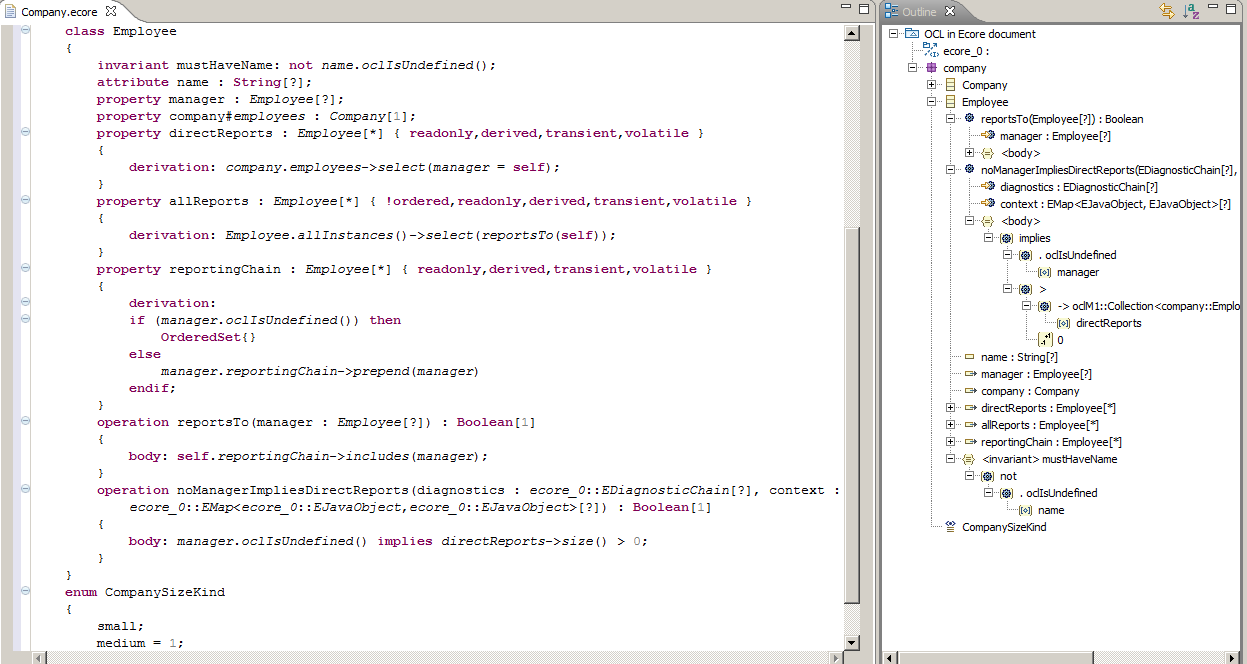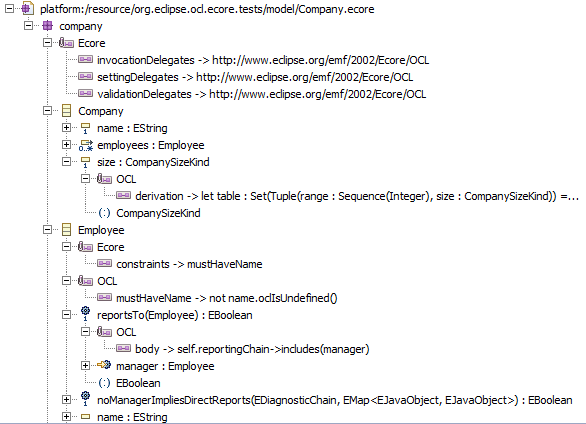Notice: This Wiki is now read only and edits are no longer possible. Please see: https://gitlab.eclipse.org/eclipsefdn/helpdesk/-/wikis/Wiki-shutdown-plan for the plan.
OCL/OCLinEcore
This page describes functionality first available in the Helios (Eclipse 3.6) release.
A brief example of the editor is followed by the description of the Ecore representation.
A tutorial introducing OCL and its integration with Ecore forms part of the OCL Developer Guide accompanying the OCL release and is available online at OCL Developer Guide.
OCLinEcore Editor
The Sample Ecore Editor is convenient for maintaining a couple of OCL constraints, but it has distinct limitations as an Integrated OCL Development Environment:
- maintenance of the EAnnotations needs care.
- the OCL expression is difficult to read in the Properties View.
- syntactic and semantic errors in the OCL are not detected.
The OCLinEcore Editor overcomes these limitations. The Editor has been available for use since Eclipse OCL 3.0.0 by installing the Eclipse OCL Examples and Editors functionality.
- The Examples functionality may be installed directly using Help->Install New Software from the Indigo, Juno site or Kepler sites; Select the OCL Examples and Editors Feature from the Modeling category.
With the OCLinEcore Editor installed, you may select the Ecore file in a Navigator (Resource Explorer, Package Explorer,...) and invoke Open With->OCLinEcore Editor from the context dependent right button menu. The display should show
The above display is the unchanged result of opening Company.ecore.
Beware that the editor is very new; there is validation of name references but not of their types; this is work in progress. Sometimes spurious errors are displayed, which may go away with a Save, but may require an editor close and reopen.
The OCLinEcore Document may be edited with the aid of syntax and semantic validation and completion suggestions.
Whitespace and OCL comments within and surrounding the OCL expressions are persisted in the Ecore EAnnotations. If you want to persist comments outside of the OCL context, invoke SaveAS OclInEcore for the Document root in the Outline.
The OCLinEcore uses strict OMG syntax for OCL expressions and an extrapolation of that to the surrounding Ecore. A full write up is TBD. The surrounding syntax of the example editor is open to debate and may change once the editor ceases to be an example in the release after Helios.
Ecore Representation
OCL can be embedded in Ecore using annotations. Maintenance of these annotations is performed automatically by the OCLinEcore editor described later. This section explains the underlying representation and so descibes their direct maintenance using the Sample Ecore Editor. An example is shown below.
The relevant annotations (a purple dumbbell with a paperclip) may be added by selecting New Child->EAnnotation and then New Child->Details Entry.
EPackage configuration
The embedded OCL becomes active when the appropriate delegate functionality is specified. In practice all three functionalities should be specified. This specification provides EMF with the required configuration information to access the extended functionality provided by these delegates.
Setting Delegate
The setting delegate functionality enables OCL expressions to define initial or derived value of an EStructuralFeature. Thus when eGet(CompanyPackage.Literals.COMPANY__SIZE) or Company.getSize() is invoked the OCL expression is evaluated to provide the value. In an OCL context, the corresponding eSet or setSize is not applicable.
The setting delegate is specified by an EPackage EAnnotation with:
Source = "http://www.eclipse.org/emf/2002/Ecore"
Key = "settingDelegates"
Value = "http://www.eclipse.org/emf/2002/Ecore/OCL"
The delegate value matches an org.eclipse.emf.ecore.setting_delegate extension point usage in the org.eclipse.ocl.ecore plug-in that provides the delegate functionality. Multiple comma-separated delegates may be specified.
Invocation Delegate
The invocation delegate functionality enables OCL expressions to define the body of an EOperation. Thus when eInvoke(CompanyPackage.Literals.EMPLOYEE__REPORTS_TO) or Employee.reportsTo() is invoked the OCL expression is evaluated to provide the value.
The invocation delegate is specified by an EPackage EAnnotation with:
Source = "http://www.eclipse.org/emf/2002/Ecore"
Key = "invocationDelegates"
Value = "http://www.eclipse.org/emf/2002/Ecore/OCL"
The delegate value matches an org.eclipse.emf.ecore.invocation_delegate extension point usage in the org.eclipse.ocl.ecore plug-in that provides the delegate functionality. Multiple comma-separated delegates may be specified.
Note: When generating the java classes from your genmodel, remember to set the genmodel option 'Operation Reflection' to true. (From EMF 2.8 onwards, 'true' is the default.)
Validation Delegate
The validation delegate functionality enables OCL expressions to define one or more invariants of an EClassifier. Thus when the EValidator is activated to validate the classifier, the OCL expressions are evaluated.
The validation delegate is specified by an EPackage EAnnotation with:
Source = "http://www.eclipse.org/emf/2002/Ecore"
Key = "validationDelegates"
Value = "http://www.eclipse.org/emf/2002/Ecore/OCL"
The delegate value matches an org.eclipse.emf.ecore.validation_delegate extension point usage in the org.eclipse.ocl.ecore plug-in that provides the delegate functionality. Multiple comma-separated delegates may be specified.
EClassifier invariants
Ecore provides two different representation for an OCL invaraint that refines the behavior of an EClassifier. One representation exposes the invariant as part of the EClassifier API.
Each non-API invariant is represented as an EAnnotation for the named OCL-invariant constraint and an EAnnotation to enumerate the invariant names. This form of OCL invariant is called a constraint in Ecore documentation. The invariant does not contribute to the EClassifier API.
Each API invariant is represented by an EOperation for the named OCL-invariant constraint, with an EAnnotation to define the operation body. This form of OCL invariant is called an invariant in Ecore documentation. The EOperation contributes to the EClassifier API allowing it to be invoked by application code; perhaps for incremental re-evaluation of invariants.
non-API invariant
The example shows the specification of the body for the Employee mustHaveName invariant equivalent to the following OCL Document snippet.
context Employee inv mustHaveName: not name.oclIsUndefined()
The body is specified by an EClassifier EAnnotation with:
Source = "http://www.eclipse.org/emf/2002/Ecore/OCL"
Key = "mustHaveName"
Value = ...the OCL expression...
and an EClassifier EAnnotation with:
Source = "http://www.eclipse.org/emf/2002/Ecore"
Key = "constraints"
Value = space-separated list of invariant names
API invariant
The example partially shows the specification of the body for the Employee noManagerImpliesDirectReports invariant equivalent to the following OCL Document snippet.
context Employee inv noManagerImpliesDirectReports: manager.oclIsUndefined() implies directReports->size() > 0
There is no need for any EClassifier EAnnotation. The invariant body should be specified as an EOperation body.
The EOperation must have an EBoolean return, and two parameters of type EDiagnosticChain and EMap<EjavaObject, EJavaObject>.
EStructuralFeature initial and derived values
The example shows the specification of a derived value for the Company::size EStructuralFeature equivalent to the following OCL Document snippet.
context Company::size : CompanySizeKind
derive:
let table : Set(Tuple(range : Sequence(Integer), size : CompanySizeKind)) =
Set{
Tuple{range=Sequence{0..49}, size=CompanySizeKind::small},
Tuple{range=Sequence{50..999}, size=CompanySizeKind::medium},
Tuple{range=Sequence{1000..1000000}, size=CompanySizeKind::large}}
in table->any(range->includes(employees->size())).size
The derived value is specified by an EStructuralFeature EAnnotation with:
Source = "http://www.eclipse.org/emf/2002/Ecore/OCL"
Key = "derivation"
Value = ...the OCL expression...
An initial value may be similarly specified with:
Source = "http://www.eclipse.org/emf/2002/Ecore/OCL"
Key = "initial"
Value = ...the OCL expression...
EOperation bodies, preconditions and postconditions
The example shows the specification of the body for the Employee::reportsTo(Employee) EOperation equivalent to the following OCL Document snippet.
context Employee::reportsTo(manager : Employee) : Boolean body:self.reportingChain->includes(manager)
The body is specified by an EOperation EAnnotation with:
Source = "http://www.eclipse.org/emf/2002/Ecore/OCL"
Key = "body"
Value = ...the OCL expression...
A precondition or postcondition may be similarly specified using "precondition" or "postcondition" as the Key.
Note that preconditions and postconditions are currently ignored by Eclipse OCL (4.1.0).
Registration
Plugin
Within Eclipse, the OCL delegate functionality should be provided automatically by the plugin registration provided you have Eclipse OCL installed. The OCLinEcore editor requires the Eclipse OCL Examples and Editors to be installed too.
Standalone
If running standalone, you need to register the OCL delegates by hand, using code such as:
import org.eclipse.emf.ecore.EOperation; import org.eclipse.emf.ecore.EStructuralFeature; import org.eclipse.emf.ecore.EValidator; import org.eclipse.ocl.ecore.delegate.OCLDelegateDomain; import org.eclipse.ocl.ecore.delegate.OCLInvocationDelegateFactory; import org.eclipse.ocl.ecore.delegate.OCLSettingDelegateFactory; import org.eclipse.ocl.ecore.delegate.OCLValidationDelegateFactory; String oclDelegateURI = OCLDelegateDomain.OCL_DELEGATE_URI; EOperation.Internal.InvocationDelegate.Factory.Registry.INSTANCE.put(oclDelegateURI, new OCLInvocationDelegateFactory.Global()); EStructuralFeature.Internal.SettingDelegate.Factory.Registry.INSTANCE.put(oclDelegateURI, new OCLSettingDelegateFactory.Global()); EValidator.ValidationDelegate.Registry.INSTANCE.put(oclDelegateURI, new OCLValidationDelegateFactory.Global());
(An initialization routine will be provided in a future release.)
Troubleshooting
Problem: I cannot set 'Operation Reflection' to true. / I do not get Java-Code for my OCL method bodys.
Solution: Ensure that Compliance Level in the genmodel is set to at least 6.0.


